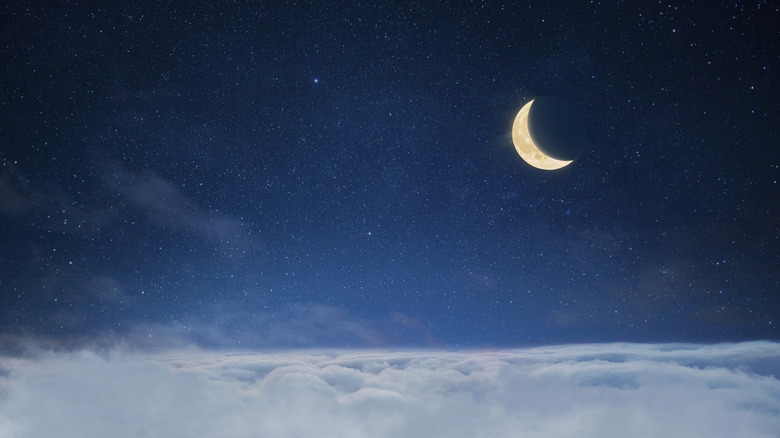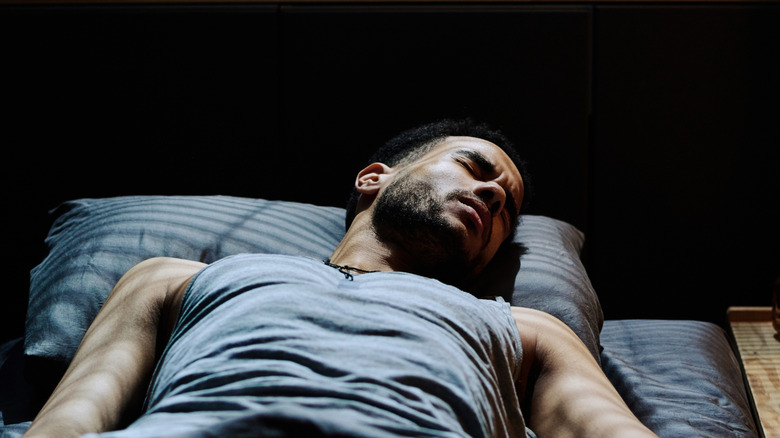The Bodily Function That Becomes Impossible While You're Asleep
It's sort of unsettling to think that our body paralyzes itself during sleep, but that is essentially what happens for large portions of the night when your body's getting the sleep it needs. You've likely heard of sleep paralysis, which refers to a terrifying state whereby individuals become conscious during sleep but are unable to move. Sufferers experience the condition to varying degrees but regardless of the severity, sleep paralysis isn't something anyone would ever want to experience.
Exactly what causes such a horrifying condition remains unclear, but experts believe it's tied to the rapid eye movement (REM) cycle. This is the stage of sleep when dreams usually occur and as such, our brains paralyze our muscles in a process known as REM atonia so that we don't act out those dreams (although you should still pay attention to them, nightmares may indicate a serious illness). For large chunks of the night, then, we are essentially paralyzed, which is both reassuring in the sense we don't want to be running around acting out our dreams without realizing, but also quite disconcerting when you think that our brains have the ability to render us immobile — especially when you consider seemingly essential functions like sneezing.
Sneezing is an adaptation humans evolved to quickly rid ourselves of unwanted invaders and surely we still need to be able to do so when asleep? Well, just like with acting out our dreams, it's actually impossible to sneeze during sleep — at least in certain stages of sleep — and it turns out this is tied to the same function that is thought to be involved in sleep paralysis.
REM sleep paralyzes our body
REM sleep isn't the deepest form of sleep, it is, however, a fairly deep stage. REM sleep is when dreams occur, and it's during this stage that the central nervous system is surprisingly active. As such, our brains ensure our skeletal motor systems is put into a state of muscle paralysis, or muscle atonia, but the actual mechanisms involved in setting off this paralysis have remained somewhat mysterious for decades.
A 2012 study published in the Journal of Neuroscience looked at the phenomenon of muscle paralysis during REM sleep and identified two powerful brain chemical systems which actually work in tandem to paralyze our skeletal muscles. Researchers found that neurotransmitters known as gamma-aminobutyric acid (GABA) and glycine were responsible for producing REM sleep paralysis in rats. These neurotransmitters essentially turn off the brain cells responsible for muscle activity.
As more research is conducted, scientists learn more and more about this phenomenon of muscle atonia during REM sleep. What we do know for sure is that during these phases of paralysis, we're not only prevented from moving, but we're also unable to cough, feel hunger, get the hiccups, or sneeze.
Sneezing is impossible when your body is paralyzed
Let's be honest, we don't really want invasive particles freely making their way up our nostrils while our sneezing reflex is suppressed, but that's pretty much what happens during REM sleep. In other, lighter stages of sleep, we're able to feel the sensation of particles in our nose, which momentarily wakes us so that we can sneeze, but during REM sleep, that's simply not the case.
Sneezing, or sternutation as it's also known, is an important part of our immune system, and occurs when small objects such as pollen, pet dander, smoke, bacteria, or viral particles land inside our nose. When these objects touch the mucous membrane, that membrane releases chemicals which trigger the large trigeminal nerve. This nerve is responsible for pain and touch sensations in the face, and when triggered by the mucous membrane, sends a signal to the brain, which then initiates the sneeze in order to remove the unwanted objects in our nose. The response doesn't just involve the nose, however. Our diaphragm, chest, abdomen muscles, and vocal cords all work together to rapidly expel air through our nose, hopefully removing the invaders in the process.
With that in mind, it seems somewhat disconcerting that this entire system is prevented from working while we sleep. But it's important to note that while sneezing during sleep is technically impossible, it's really only the case during the REM stage. This is due to the same process that relaxes our muscles to prevent us acting out dreams. The nerve signal action that controls sneezing is essentially suppressed during this stage of sleep and the relevant muscles become inactive, which makes it impossible for the natural process to work while we're in the REM stage.


